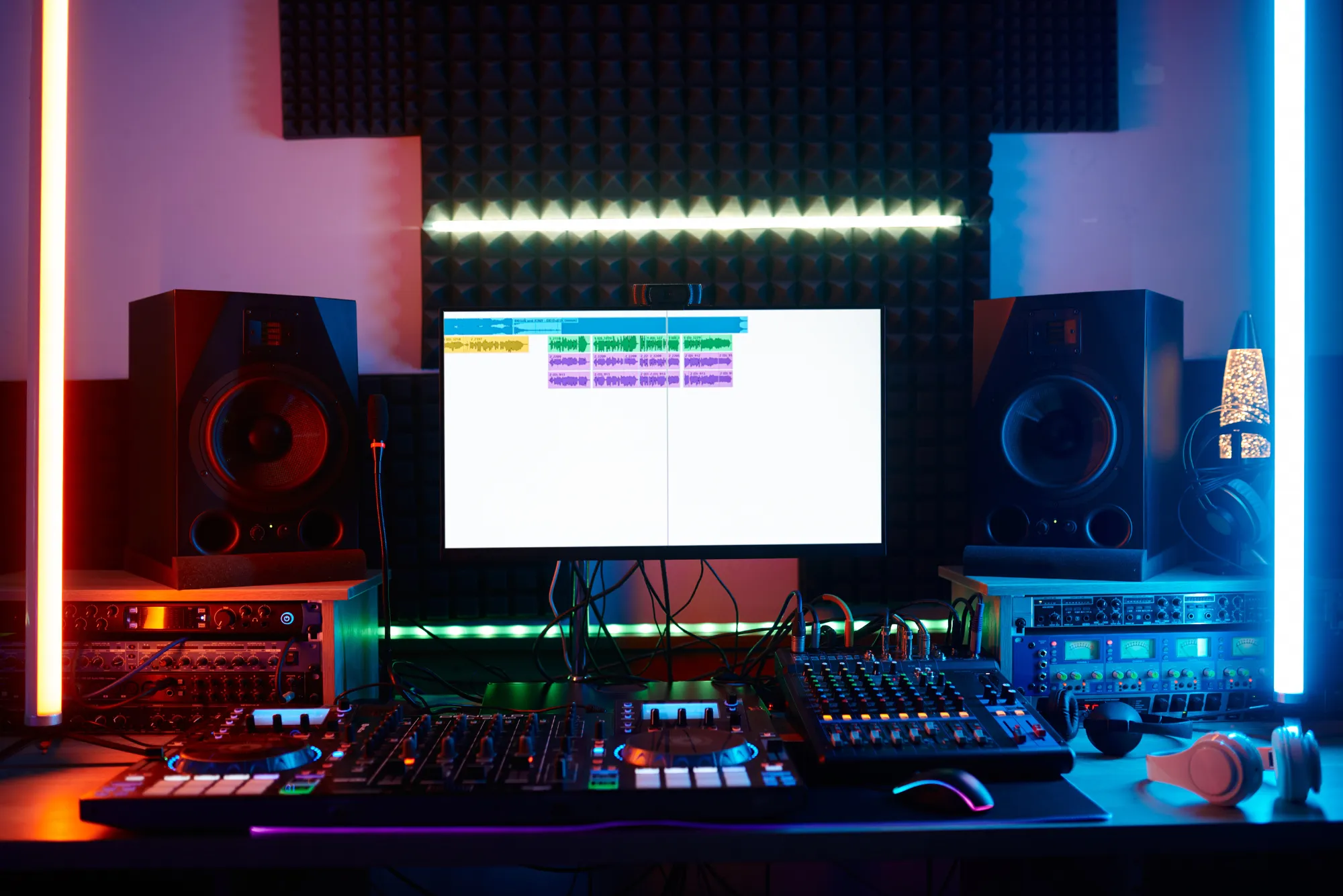Becoming a live sound engineer in India is an exciting career path for those passionate about music, technology, and live performances. Live sound engineering involves managing audio for concerts, theater productions, corporate events, and more, ensuring audiences experience high-quality sound. This guide provides a comprehensive roadmap to entering the field of live sound engineering, with a focus on opportunities in Delhi, India, where the live events industry is thriving.
Understanding Live Sound Engineering
Live sound engineering is the art and science of controlling audio equipment to deliver clear, balanced sound during live events. Engineers work with microphones, mixers, amplifiers, and speakers to create an immersive experience. In India, the demand for skilled live sound engineers is growing due to the booming music festival scene, corporate events, and cultural performances, particularly in cities like Delhi.
To succeed, you need technical expertise, creativity, and adaptability. Live sound engineering in Delhi, India, offers unique opportunities due to the city’s vibrant event culture, hosting major concerts, religious gatherings, and international conferences.
Step 1: Build a Strong Foundation
Start by understanding the basics of sound, acoustics, and audio equipment. A background in physics or electronics can help, but it’s not mandatory. Here’s how to begin:
Learn Audio Fundamentals: Study sound waves, frequency, amplitude, and signal flow. Online platforms like Coursera or YouTube offer free courses on audio basics.
Familiarize Yourself with Equipment: Learn about mixers, equalizers, compressors, and microphones. Brands like Yamaha, Soundcraft, and Shure are common in India.
Develop an Ear for Sound: Listen to live performances critically to understand balance, clarity, and tone.
High school students can focus on science and math to build a technical foundation. Joining a school band or theater group can provide early exposure to live sound setups.
Step 2: Get Formal Education or Training
While not always required, formal training can give you a competitive edge in live sound engineering. Several institutes in India offer audio engineering courses, particularly in Delhi:
Sound Engineering Schools: Institutions like the Sound Engineering Academy in Kerala or the Audio Academy in Bangalore offer diploma programs in live sound engineering. In Delhi, the Global Music Institute and AAFT School of Music provide relevant courses.
Short-Term Workshops: Look for workshops by industry professionals in Delhi, India. These are often hosted by event companies or music festivals.
Online Certifications: Platforms like Berklee Online or Point Blank Music School offer courses tailored to live sound engineering.
A diploma or certification typically takes 6 months to 2 years. These programs cover mixing techniques, system setup, and troubleshooting—key skills for live sound engineering in Delhi, India.
Step 3: Gain Practical Experience
Hands-on experience is critical in live sound engineering. Delhi’s event industry offers ample opportunities to practice:
Volunteer at Events: Start by assisting at local gigs, college fests, or community events. Venues like Blue Frog or India Habitat Centre in Delhi often need support staff.
Internships: Apply for internships with event management companies like Wizcraft or DNA Entertainment Networks, which operate in Delhi.
Shadow Professionals: Connect with experienced engineers and offer to assist them during gigs. This mentorship can teach you real-world skills like handling feedback or managing stage monitors.
Practical experience helps you understand the chaos of live events, from last-minute changes to technical glitches, preparing you for the fast-paced world of live sound engineering in Delhi,India.
Step 4: Master Essential Skills
To excel, you need a mix of technical, creative, and interpersonal skills:
Technical Proficiency: Master digital and analog mixing consoles (e.g., Yamaha CL5, Digico SD series). Learn software like Ableton Live or Pro Tools for live applications.
Problem-Solving: Live events are unpredictable. Practice troubleshooting issues like signal interference or equipment failure under pressure.
Communication: Coordinate with performers, event managers, and crew. Clear communication ensures smooth execution.
Ear Training: Develop the ability to identify and correct audio issues, such as muddy vocals or imbalanced mixes.
Regular practice with small gigs will sharpen these skills, making you a reliable professional in the field.
Step 5: Build a Network
Networking is crucial in India’s live events industry. Delhi’s music and event scene is interconnected, so relationships matter:
Attend Industry Events: Visit music festivals like NH7 Weekender or trade shows like PALM Expo to meet professionals.
Join Online Communities: Engage in forums like Sound on Sound or Indian audio groups on X and LinkedIn.
Collaborate Locally: Connect with Delhi-based bands, DJs, or theater groups. They often need sound engineers for gigs.
Building a reputation as a reliable and skilled engineer can lead to referrals and consistent work.
Step 6: Invest in Your Own Gear
While venues provide equipment, owning basic gear can set you apart. Start with:
In-Ear Monitors: Brands like Shure or Sennheiser are popular.
Microphones: Invest in versatile mics like the Shure SM58.
Cables and Accessories: XLR cables, DI boxes, and a reliable laptop for software.
As you grow, consider investing in a compact mixing console. This shows professionalism and preparedness, especially for freelance gigs in Delhi.
Step 7: Stay Updated with Trends
The live sound industry evolves rapidly. Stay current by:
Following Technology: Learn about advancements like immersive audio (e.g., L-ISA systems) or networked audio protocols (Dante).
Attending Workshops: Regularly attend training sessions or webinars by manufacturers like Bose or JBL.
Experimenting: Test new techniques during small gigs to stay innovative.
Delhi’s competitive market rewards engineers who adapt to modern tools and trends.
Step 8: Secure Your First Job
Once you have skills and experience, look for entry-level roles:
Freelance Gigs: Start with small venues or local bands. Platforms like GigSalad or local Delhi event groups on X can help.
Event Companies: Apply to firms like Showtech or Percept, which manage large-scale events in Delhi.
Theater and Studios: Some theaters and recording studios hire live sound engineers for in-house productions.
Expect starting salaries around ₹25,000–₹40,000 per month, with experienced engineers earning ₹80,000 or more. Freelancers can charge ₹5,000–₹15,000 per gig, depending on the event’s scale.
Challenges and Tips
Live sound engineering comes with challenges like long hours, high-pressure environments, and irregular schedules. Here’s how to thrive:
Stay Calm Under Pressure: Practice managing stress during chaotic events.
Maintain Health: Long hours require stamina. Prioritize rest and hydration.
Upskill Continuously: Take advanced courses to stay competitive.
Delhi’s fast-paced event scene can be demanding but rewarding for dedicated professionals.
Why Delhi?
Delhi is a hub for live events, from concerts at Siri Fort Auditorium to festivals like Hornbill. The city’s diverse venues and international events make it ideal for aspiring engineers. Live sound engineering in Delhi, India, offers exposure to high-profile gigs, helping you build a strong portfolio.
Conclusion
Becoming a live sound engineer in India requires dedication, technical skills, and networking. By starting with education, gaining hands-on experience, and building a network in Delhi’s vibrant event scene, you can carve a successful career. Stay passionate, keep learning, and embrace the dynamic world of live sound engineering to turn your love for sound into a thriving profession.




